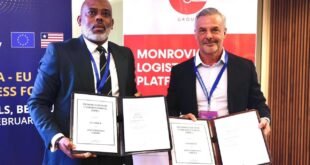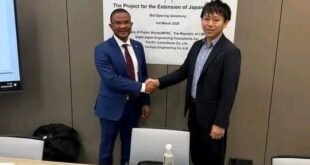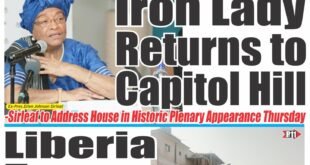By Stephen G. Fellajuah
Former Finance and Development Planning Minister Samuel D. Tweah has strongly denied allegations of mismanagement involving the US$30 million COVID-19 Household Food Support Program (COHFSP), asserting that the entire fund was solely managed by the World Food Programme (WFP), not the Liberian government.
Addressing a press conference convened over the weekend at the Congress for Democratic Change (CDC) headquarters in Congo Town, Tweah emphasized that the full US$25 million from the International Monetary Fund (IMF), along with an additional US$5 million from the World Bank, was directly transferred to the WFP.
By July 2022, according to Tweah, the WFP reported spending approximately US$23.8 million, with just over US$2 million unspent, an amount that had yet to be returned to the Liberian government or the World Bank by the time the CDC administration left office.
According to him, he presented detailed documentation and official turnover notes to support his claim, stating unequivocally that the WFP maintained full control over the disbursement and management of the funds.
“Any investigation should be directed at the WFP, not me or any other official of the George Weah-led administration,” he asserted.
Tweah went on to condemn what he described as a “sustained campaign of misinformation and character assassination,” singling out media personality Stanton Witherspoon, whom he accused of leading a four-year defamation campaign against him.
He announced plans to sue Witherspoon for spreading false claims, including recent allegations that he [Tweah] would soon be arrested in connection with the COVID-19 funds.
In his defense, Tweah referenced a letter from the current Finance Minister approving the use of a portion of the unspent COVID-19 funds for school feeding programs, an approval he claimed to have previously denied during his tenure.
He emphasized that the CDC administration left clear written recommendations regarding the unspent funds for the incoming government.
The former minister also decried what he called a “culture of silence” among individuals and institutions aware of the facts but unwilling to speak out publicly.
He called on journalists, politicians, and civil society actors to uphold higher standards of truth and accountability.
“This false narrative is undermining our national discourse and efforts to combat corruption,” Tweah said, adding that political weaponization of misinformation is damaging to Liberia’s democratic progress.
He reaffirmed his trust in Liberia’s judicial system and expressed his readiness to face any legitimate investigation.
He further highlighted the CDC administration’s legacy of securing long-term financing arrangements for critical infrastructure projects, including roads and electricity, which he said will benefit future administrations.
On the issue of anti-corruption, Tweah noted reforms under President George Weah’s leadership that granted the Liberia Anti-Corruption Commission (LACC) greater autonomy and legal authority, even limiting presidential interference.
In closing, Tweah urged Liberians to move beyond “trivial politics” and focus instead on truth, reconciliation, and national development.
This, he warned that political witch-hunts and misinformation campaigns only serve to divide the nation and distract from the real issues affecting the Liberian people.
 JamzNG Latest News, Gist, Entertainment in Nigeria
JamzNG Latest News, Gist, Entertainment in Nigeria









